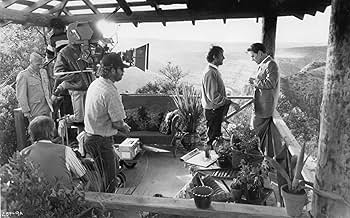AVALIAÇÃO DA IMDb
6,5/10
9,4 mil
SUA AVALIAÇÃO
Este filme reencena o Projeto Manhattan, um projeto de guerra secreto, conduzido no Novo México, onde as primeiras bombas atômicas foram projetadas e construídas.Este filme reencena o Projeto Manhattan, um projeto de guerra secreto, conduzido no Novo México, onde as primeiras bombas atômicas foram projetadas e construídas.Este filme reencena o Projeto Manhattan, um projeto de guerra secreto, conduzido no Novo México, onde as primeiras bombas atômicas foram projetadas e construídas.
- Prêmios
- 2 indicações no total
Allan Corduner
- Franz Goethe
- (as Alan Corduner)
Joe D'Angerio
- Seth Neddermeyer
- (as Joseph D'Angerio)
Jon DeVries
- Johnny Mount
- (as Jon De Vries)
Enredo
Você sabia?
- CuriosidadesThe code names for the weapons - "Fat Man" and "Little Boy" - stem from characters in the written stories of writer Dashiell Hammett. Originally the names "Fat Man" and "Thin Man" were lifted directly from the stories, but the Thin Man weapon design (a Plutonium gun-type weapon) had to be abandoned. The relatively small Uranium gun-type weapon that followed was then named "Little Boy" as a contrast to "Fat Man".
- Erros de gravaçãoIt was actually Seth Neddermeyer who originally conceived the implosion theory, and John von Neumann who refined it to usability.
- Citações
Richard Schoenfield: Hey Oppenheimer! Oppenheimer! You oughta stop playing God, 'cause you're no good at it, and the position's taken!
- Trilhas sonorasThe Sorcerer's Apprentice
Written by Paul Dukas
Performed by the Wiener Symphoniker (as The Vienna Symphony)
Edouard Van Remoortel, Conductor
Courtesy of The Moss Music Group
By Arrangement with Warner Special Products
Avaliação em destaque
It's rare for a movie to both encompass the process of problem solving and a fantastically far-reaching moral quandary AND be a fairly accurate historical movie, but Fat Man and Little Boy pulls off this trick.
It's the story of the Manhattan Project -- the World War II effort to build the atom bomb, told as the conflict between the two men who made it happen, Gen. Leslie Groves and Robert Oppenheimer.
The historical figures are a great study in opposites: military vs. civilian, practical vs. idealistic, emotional vs. scientific, brute force vs. consensus-based problem solving, immediacy vs. long-term vision. A fictional character, played by John Cusack, is added as a sort of synthesis of the two historical figures, to show the humanity that oddly escapes the real people (and of course the obligatory love interest, played by Laura Dern). One looking for a straight documentary might criticize the lapses into melodrama (and occasional looseness with the facts, but that's Hollywood for ya), but the purpose of fiction is to synthesize and galvanize events into more universal truths, so I think this can be forgiven.
One of the great visuals in the movie is when Oppenheimer witnesses the first atomic explosion: it's done entirely through his reaction, and considering the awesome visuals inherent in an atomic explosion, it's a brave and entirely effective way of describing in a single moment the ambivalent effect on humans of unleashing such power (the sort of thing lost in the typical Hollywood shoot 'em up version of history.) The use of music is particularly excellent in the last third of the movie.
Fairly accessible and highly recommended as both a historical movie and drama of the highest order.
It's the story of the Manhattan Project -- the World War II effort to build the atom bomb, told as the conflict between the two men who made it happen, Gen. Leslie Groves and Robert Oppenheimer.
The historical figures are a great study in opposites: military vs. civilian, practical vs. idealistic, emotional vs. scientific, brute force vs. consensus-based problem solving, immediacy vs. long-term vision. A fictional character, played by John Cusack, is added as a sort of synthesis of the two historical figures, to show the humanity that oddly escapes the real people (and of course the obligatory love interest, played by Laura Dern). One looking for a straight documentary might criticize the lapses into melodrama (and occasional looseness with the facts, but that's Hollywood for ya), but the purpose of fiction is to synthesize and galvanize events into more universal truths, so I think this can be forgiven.
One of the great visuals in the movie is when Oppenheimer witnesses the first atomic explosion: it's done entirely through his reaction, and considering the awesome visuals inherent in an atomic explosion, it's a brave and entirely effective way of describing in a single moment the ambivalent effect on humans of unleashing such power (the sort of thing lost in the typical Hollywood shoot 'em up version of history.) The use of music is particularly excellent in the last third of the movie.
Fairly accessible and highly recommended as both a historical movie and drama of the highest order.
- wall17
- 21 de jun. de 2002
- Link permanente
Principais escolhas
Faça login para avaliar e ver a lista de recomendações personalizadas
- How long is Fat Man and Little Boy?Fornecido pela Alexa
Detalhes
Bilheteria
- Orçamento
- US$ 30.000.000 (estimativa)
- Faturamento bruto nos EUA e Canadá
- US$ 3.563.162
- Fim de semana de estreia nos EUA e Canadá
- US$ 1.476.994
- 22 de out. de 1989
- Faturamento bruto mundial
- US$ 3.563.162
- Tempo de duração2 horas 7 minutos
- Cor
- Proporção
- 2.39 : 1
Contribua para esta página
Sugerir uma alteração ou adicionar conteúdo ausente

Principal brecha
What was the official certification given to O Início do Fim (1989) in Spain?
Responda



































